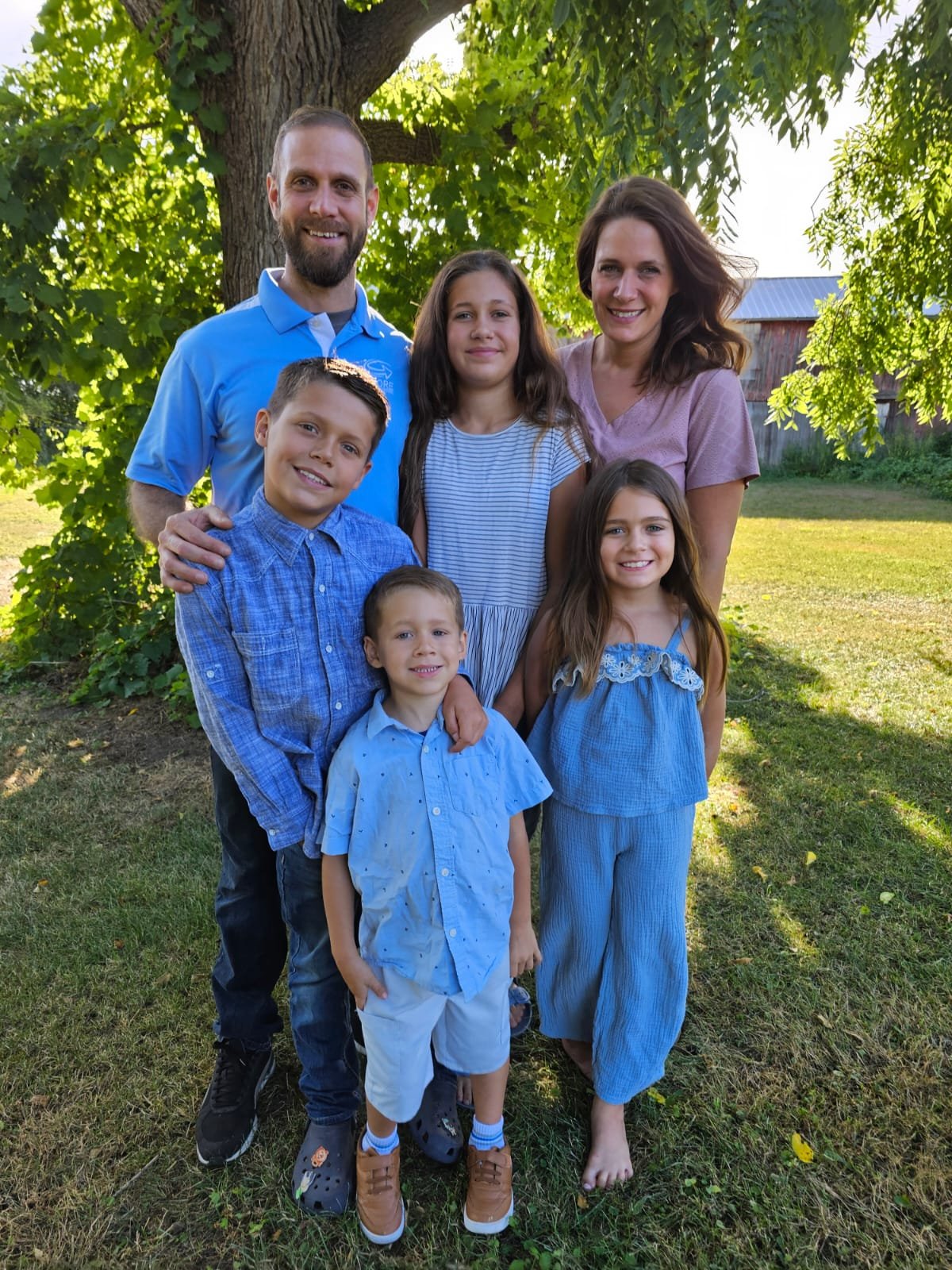The Acevedos
Missionaries in Uruguay
Matias, Bethany, Amelia, Elliott, Olivia and Judah Acevedo

Welcome! We are the Acevedos, missionaries in Uruguay with SCORE INTERNATIONAL since 2011. I (Matias) am originally from Uruguay and my wife, Bethany, is from Western NY. God has called us to serve Him in the country of Uruguay in South America.
Our main goal is to glorify God by being obedient to His call, seeking to reach the lost with the gospel,equipping and training them to be faithful followers of Jesus Christ (Mt. 28:18-20; Co.1:28, 29).
"I have been crucified with Christ and I no longer live, but Christ lives in me. The life I now live in the body, I live by faith in the Son of God, who loved me and gave himself for me."
Vision for Uruguay
God has burdened our hearts for the people in Uruguay, not only because I'm from there, but more so, because there are so many people who don’t know the Lord. Therefore, our goal is to plant biblical churches in Uruguay.
We want to see men, women, and children become like Christ; Loving, living, growing, and sharing Jesus (Co. 1:28, Eph. 4:7-16).
Mission for Uruguay
- To accomplish this vision we follow a biblical strategy (Acts 18:1-11) which can be summarized as this...
GO

There is no substitute for going and connecting we the people we are reaching, living out the faith before them (Act. 18:1-3; John 1:1,14; 3:16,).
SHARE

Connecting with the people is going to provide multiple and regular gospel conversations (Act 18:4; Cor.5:20).
TEACH

Once people come to Christ, we have to guide them in the next step of growing in Christ (Act. 18:5-11; Jn. 15:4, 5, Eph. 4:1-16; 5:1,2).
TRAIN

The next step, is to train believers to be disciple-makers and transmit the Biblical truths to the next generation (Act. 18:11 Mt. 28:19, 20; 2 Ti. 2:2).
"Only one life, ’twill soon be past, Only what’s done for Christ will last."
Testimonies and Work
Matias Acevedo
I was born and raised in Montevideo, Uruguay. I grew up in a christian family attending Iglesia Templo Calvario, in Montevideo Uruguay. I was saved at the age of 12 during a Christian camp. At the age of 16 God called me to the ministry through the preaching of His Word. But that was just the beginning of the journey. At the age of 18 I started to pursue a biblical education, and since then The Lord has been preparing me for His work. I studied 2 years in a Bible Institute in Uruguay (FB. Dabold from EMU), and in 2010, I did an internship program with SCORE international in the Dominican Republic. Also I studied in The Expositor's Institute (Spanish program of The Master's Seminary) pursuing a deeper understanding of the Word of God. In 2016 I was Ordained as a pastor through our home and sending church, Ridgewood Bible Church. Currently I'm finishing a M.div. in the Southern Baptist Theological Seminary.
Bethany Acevedo
I was born in Western NY, I grew up in a christian family attending Hartland Biblie Church. I was saved at a young age. At 19 years old, the Lord began preparing me to serve Him full time. In 2008 I studied the bible and learned spanish in Costa Rica. One year later I went to the Dominican Republic and served the Lord in an internship program. I then later served in the DR as a missionary for 2 years with SCORE.
Together
It wasnʼt until 2009 that we came to know each other in the Dominican Republic. I (Matias) was visiting my cousins who were serving the Lord for a time in the DR. (They are now serving in Panama). God orchestrated everything! And on September 30, 2011 we were married, and today we are serving the Lord with SCORE International.
Currently Matias is serving in Uruguay:
- Co-pastoring a small church, Iglesia Biblica Neptunia.
- Serving on the committee and teaching in a Biblical Seminary (Faculty of Biblical Studies of Uruguay).
- Coaching youth soccer. This has giving us opportunities to meet families and build relationships to share the gospel.
- Helping to organize and hold a biblical counseling conference.
- Oversighting a Christ-centered drug rehabilitation center in Uruguay (SE PUEDE).
"Amazing grace how sweet the sound that saved a wretch like me."
Do we need Jesus?
Consider the following truths found in the Bible.
The Bible says we were created by a personal God to love, serve, and enjoy endless fellowship with Him. The New Testament reveals it was Jesus Himself who created everything (“Through him all things were made; without him nothing was made that has been made.” - John 1:3; “For in him all things were created: things in heaven and on earth, visible and invisible, whether thrones or powers or rulers or authorities; all things have been created through him and for him.” - Colossians 1:16). Therefore, He also owns and rules everything (“The Lord has established his throne in heaven, and his kingdom rules over all.” - Psalm 103:19). That means He has authority over our lives and we owe Him absolute allegiance, obedience, and worship.
According to Scripture, everyone is guilty of sin: “There is no one righteous, not even one” - Rom.3:10. That doesn't mean we're incapable of performing acts of human kindness. But we're incapable of understanding, loving, or pleasing God on our own.
“There is no one righteous, not even one; there is no one who understands; there is no one who seeks God. All have turned away, they have together become worthless;” - Romans 3:10-12
God is absolutely and perfectly holy (“Holy, holy, holy is the Lord Almighty; the whole earth is full of his glory.” - Isaiah 6:3); therefore He cannot commit or approve of evil (“When tempted, no one should say, “God is tempting me.” For God cannot be tempted by evil, nor does he tempt anyone;” - James 1:13). God requires holiness of us as well. 1 Peter 1:16 says, “You shall be holy, for I am holy.” God's holiness and justice demand that all sin be punished by death (“For everyone belongs to me, the parent as well as the child—both alike belong to me. The one who sins is the one who will die.” - Ezekiel 18:4). That's why simply changing our patterns of behavior can't solve our sin problem or eliminate its consequences.
God's justice demands death for sin, but His love has provided a Savior who paid the penalty and died for sinners (“For Christ also suffered once for sins, the righteous for the unrighteous, to bring you to God. He was put to death in the body but made alive in the Spirit.” - 1 Peter 3:18). Christ's death satisfied the demands of God's justice, and Christ's perfect life satisfied the demands of God's holiness (“God made him who had no sin to be sin for us, so that in him we might become the righteousness of God” - 2 Corinthians 5:21), thereby enabling Him to forgive and save those who place their faith in Him (“he did it to demonstrate his righteousness at the present time, so as to be just and the one who justifies those who have faith in Jesus.” - Romans 3:26).
Jesus said, “I am the way and the truth and the life. No one comes to the Father except through me.” - John 14:6.
Do we need Jesus? I hope your answer is, Yes! So the next question should be, what should I do? Jesus did everything, place your faith in Him.
“If you confess with your mouth Jesus as Lord, and believe in your heart that God raised Him from the dead” - Romans 10:9.
True faith is always accompanied by repentance from sin. Repentance is agreeing with God that you are sinful, confessing your sins to Him, and making a conscious choice to turn from sin (Luke 13:3, 5; 1 Thessalonians 1:9), pursue Christ (Matthew 11: 28-30; John 17:3), and obey Him (1 John 2:3). It isn't enough to believe certain facts about Christ. Even Satan and his demons believe in the true God (James 2:19), but they don't love and obey Him. True saving faith always responds in obedience (Ephesians 2:10)..
What do you know about Uruguay?
General Information
-
Location

Google Map picture República Oriental del Uruguay is a country in the southeastern region of South America. It is bordered by Argentina to its west and Brazil to its north and east, with the Atlantic Ocean to the south and southeast.
-
Population
2017
2016
2015
2014
Estimation
3.45 millions
3.44 millions
3.43 millions
3.42 millionsUruguay is home to 3.45 million people, of whom 1.8 million live in the metropolitan area of its capital and largest city, Montevideo.
-
Area

Google Map picture, escale 500mi With an area of approximately 176,000 square kilometers (68,000 sq mi) being a little bigger than Forida's state(65,755 sq mi), Uruguay is geographically the second-smallest nation in South America after Suriname.
-
Language
Official language: Spanish
Uruguayan Spanish has some modifications due to the considerable number of Italian immigrants. Immigrants used to speak a mixture of Italian and Spanish known as 'cocoliche' and some of the words are still commonly used by the population. English is common in the business world and its study has risen significantly in recent years, especially among the young. Other languages include Portuguese and Portuñol (a mixture of Spanish and Portuguese). Both are spoken in the northern regions near the Brazilian border. As few native people exist in the population, no indigenous languages are thought to remain in Uruguay.
-
Education
Education in Uruguay is secular, free, and compulsory for 14 years, starting at the age of 4. The system is divided into six levels of education: early childhood (3–5 years); primary (6–11 years); basic secondary (12–14 years); upper secondary (15–17 years); higher education (18 and up); and post-graduate education.
Public education is the primary responsibility of three institutions: the Ministry of Education and Culture, which coordinates education policies, the National Public Education Administration, which formulates and implements policies on early to secondary education, and the University of the Republic, responsible for higher education. In 2009, the government planned to invest 4.5% of GDP in education.
Uruguay ranks high on standardised tests such as PISA at a regional level, but compares unfavourably to the OECD average, and is also below some countries with similar levels of income. In the 2006 PISA test, Uruguay had one of the greatest standard deviations among schools, suggesting significant variability by socio-economic level. -
Culture
Cuisine
Beef is fundamental to Uruguayan cuisine, and the country is one of the world's top consumers of red meat per capita. Asado, a kind of barbecued beef, and is the national dish in Uruguay. Other popular foods include beef platters, chivito (steak sandwiches), pasta, barbecued kidneys, and sausages.
Uruguay and Argentina share a national drink called mate. Mate has a strong cultural significance as national identity and social gathering. Drinking mate is a common social practice it is considered to be a tradition taken from the gauchos. Often locals can be seen carrying leather cases containing a thermos of hot water, the traditional hollowed gourd called a mate or guampa, a metal straw called a bombilla, and the dried yerba mate leaves. Sweet treats, including flan, dulce de leche, and alfajores (shortbread cookies), are favorites for desserts or afternoon snacks.
Other Uruguayan dishes include morcilla dulce (a type of blood sausage cooked with ground orange fruit, orange peel, and walnuts), chorizo, milanesa (a breaded veal cutlet similar to the Austrian Wienerschnitzel), snacks such as olímpicos (club sandwiches), húngaras (spicy sausage in a hot dog roll), and masas surtidas (bite-sized pastries).Sports
Futbol (soccer) is the most popular sport in Uruguay. The first international match outside the British Isles was played between Uruguay and Argentina in Montevideo in July 1902. Uruguay won gold at the 1924 Paris Olympic Games and again in 1928 in Amsterdam.
The Uruguay national futbol team has won the FIFA World Cup on two occasions. Uruguay won the inaugural tournament on home soil in 1930 and again in 1950, famously defeating home favourites Brazil in the final match. Uruguay has won the Copa América (an international tournament for South American nations and guests) more than any other country, their victory in 2011 making a total of 15 Copa Américas won. Uruguay has by far the smallest population of any country that has won a World Cup. Uruguay performed very credibly in the 2010 FIFA World Cup, having reached the semi-final for the first time in 40 years. Diego Forlán was presented with the Golden Ball award as the best player of the 2010 tournament. In the rankings for June 2012, Uruguay was ranked the second best team in the world, according to the FIFA world rankings, their highest ever point in futbol history, falling short of the first spot to the Spain national futbol team.
Uruguay exported 1,414 futbol players during the 2000s, almost as many players as Brazil and Argentina. In 2010, the Uruguayan government enacted measures intended to retain players in the country.
Futbol was taken to Uruguay by English sailors and labourers in the late 19th century. Less successfully, they introduced rugby and cricket. There are two Montevideo-based futbol clubs, Nacional and Peñarol, who are successful in domestic and South American tournaments and have won three Intercontinental Cups each.Music
The most distinctive music of Uruguay is to be found in the tango and candombe; both genres have been recognized by UNESCO as an Intangible Cultural Heritage of Humanity. Uruguayan music includes a number of local musical forms such as murga, a form of musical theatre, and milonga, a folk guitar and song form deriving from Spanish traditions and related to similar forms found in many Hispanic-American countries
Religion
-
Uruguay has no official religion; church and state are officially separated, and religious freedom is guaranteed. After independence, anti-clerical ideas spread to Uruguay, particularly from France, further eroding the influence of the church. In 1837, civil marriage was recognized and in 1861 the state took over the running of public cemeteries. In 1907, divorce was legalized and in 1909, all religious instruction was banned from state schools. Under the influence of the innovative Colorado reformer José Batlle y Ordóñez (1903–1911), complete separation of church and state was introduced with the new constitution of 1917. The decadence took its course and In 2012, abortion was legalized. In 2013, same-sex marriage and cannabis were legalized. In 2014 Uruguay was the first country to regulate legal production, sale and consumption of marijuana.
-
Religion in Uruguay (2010)
- Catholicism
- 47
- Non-religious
- 39
- Protestantism
- 11
- Other
- 3
-
According to The Pew Research Center 2014
"Uruguay is the most secular country in Latin America."
- Read it on Pew Research CenterPercentages of Christianity (Catholic/Protestant) in Latin America.
Bar graph taken from The Pew Research Center "Uruguay is the most agnostic country of Latin America, and has the lowest percentage of Christianity in the population. Furthermore, it is the only country in the region in which the people are quick to turn from religion, or "rapid secularization""
- News Paper "El País" - Uruguay
Contact
Get in Touch
| +598 92 954 995 | ||
| +1 716 438 6299 | ||
| matiasandbethany@gmail.com | ||
| SCORE INTERNATIONAL |










